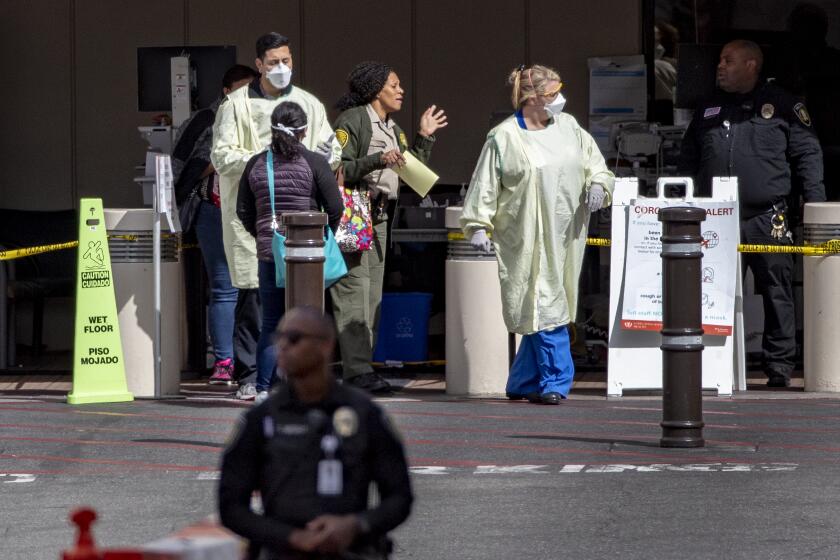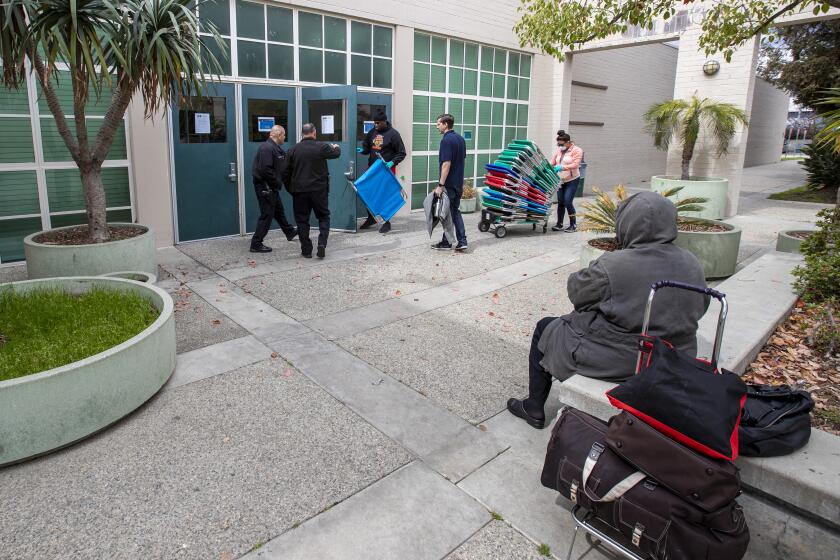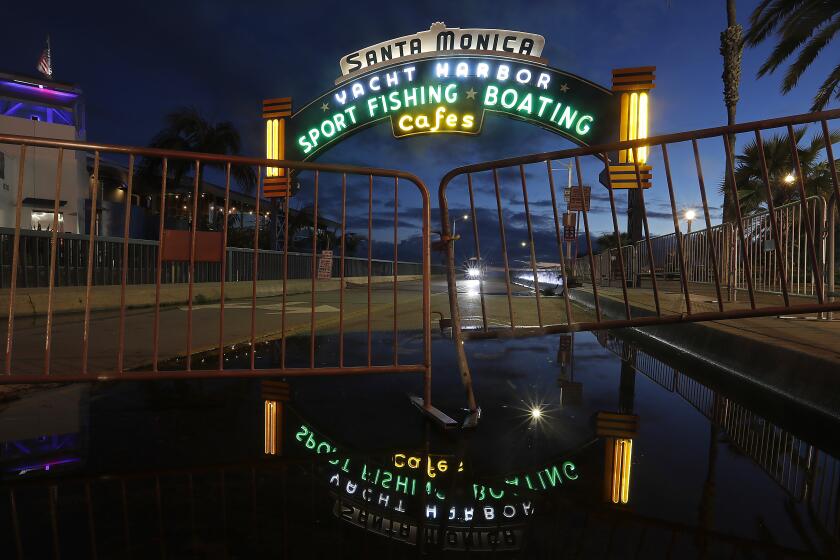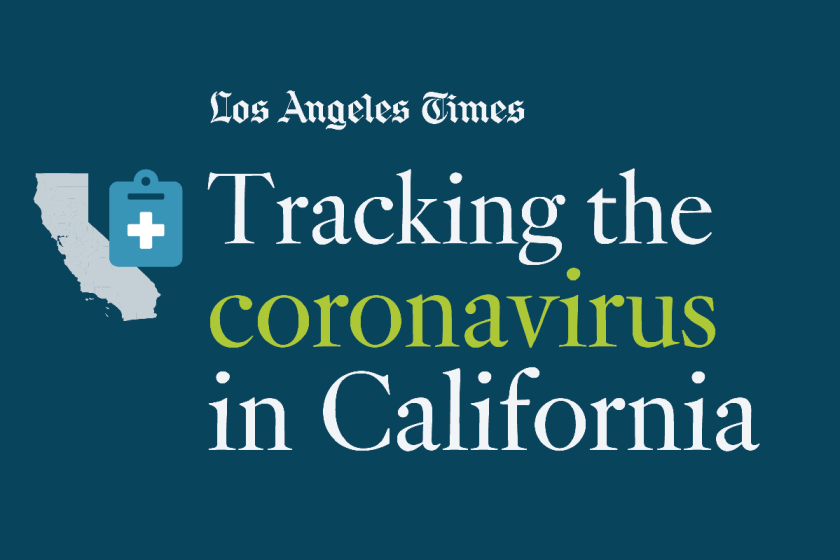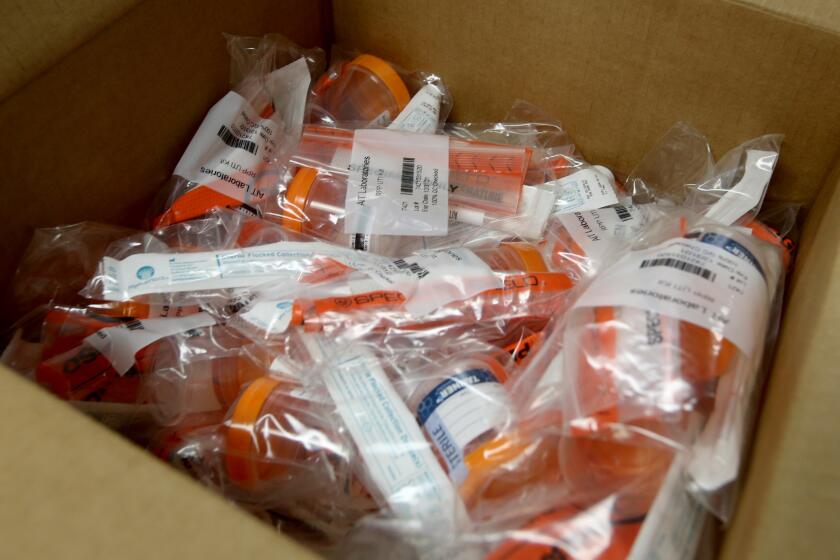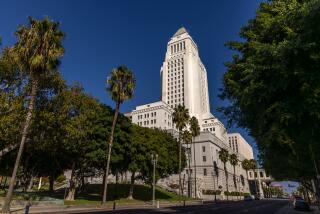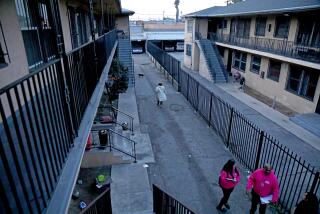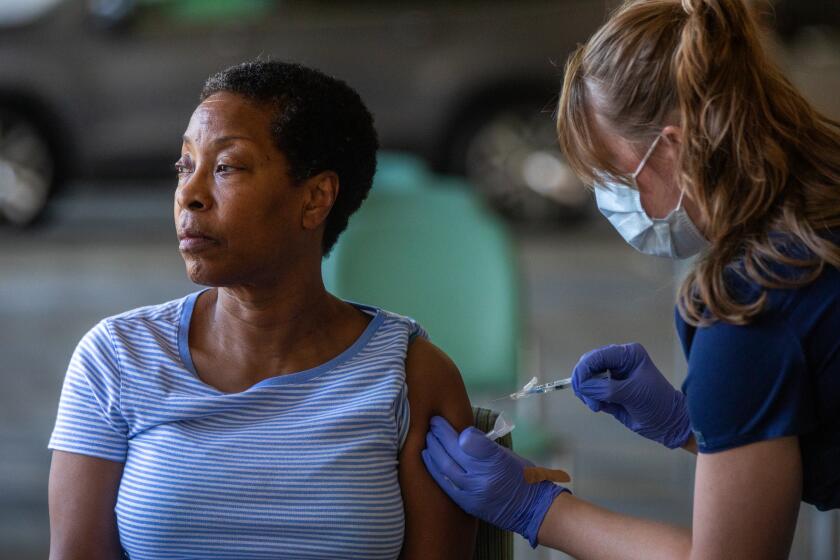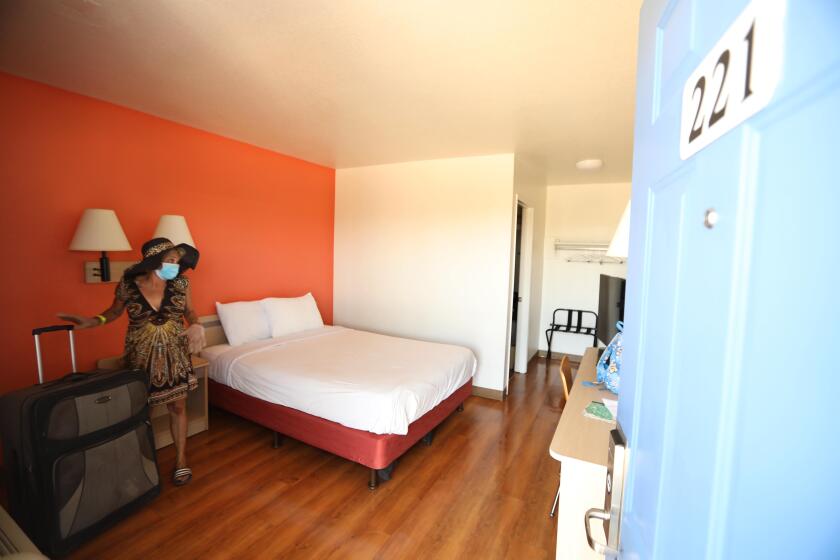Emergency order prohibits L.A. rental units from being pulled off the market
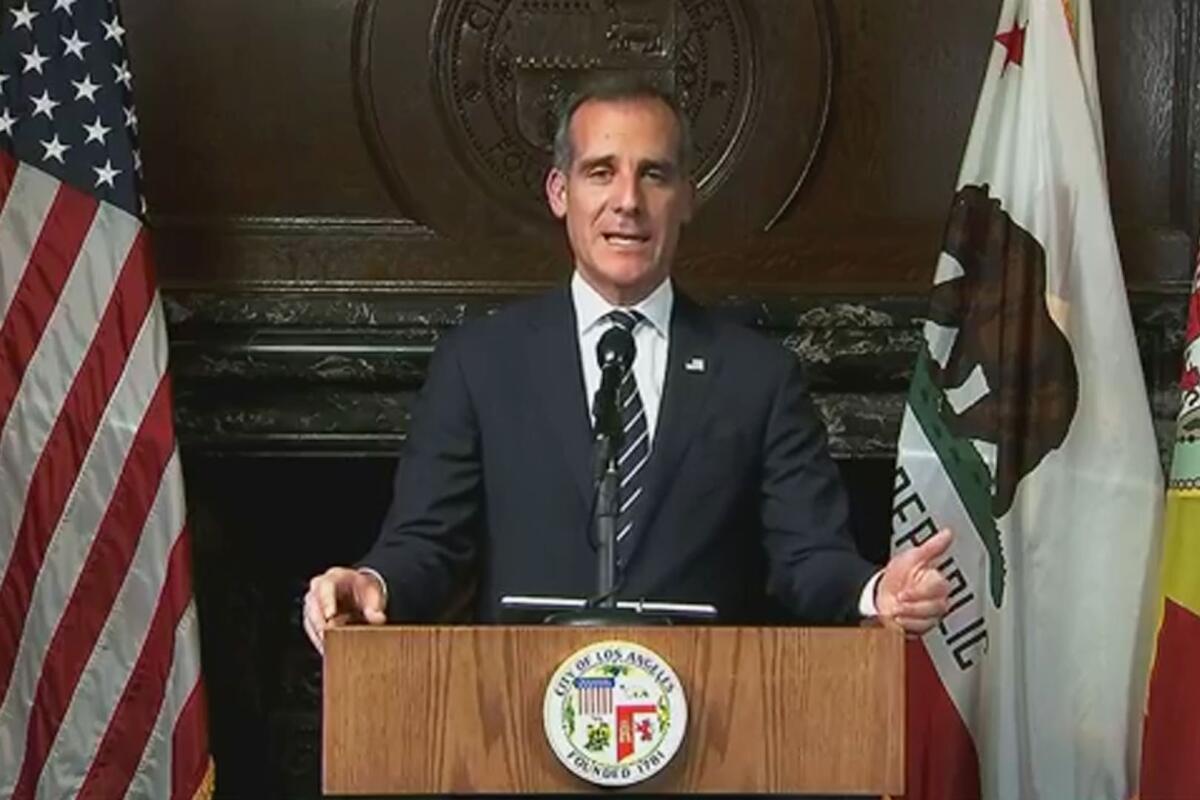
The city of Los Angeles has expanded its temporary ban on evictions during the novel coronavirus outbreak by prohibiting landlords from removing tenants from rent-stabilized apartments for the purposes of converting them to condominiums, Mayor Eric Garcetti announced Monday afternoon.
Garcetti said at a news conference that he was enacting an executive order prohibiting such evictions under the Ellis Act, a state law that allows people to be ejected from rent-stabilized apartments if the landlord is getting out of the rental business, which can include turning the building into condos.
“This is necessary to protect additional tenants from being displaced from their homes at the exact same moment we’re asking them to stay at home,” Garcetti said.
Between 2001 and 2018, more than 25,000 apartments that had been covered by the city’s rent control laws were removed from the market through the Ellis Act, according to city statistics. Garcetti’s order applies to tenants who have already received eviction notices under the act but whose date for vacating their apartments has not occurred.
Monday’s order follows one Garcetti announced last week, which prohibits the evictions of any tenant in the city that can’t pay rent due to health or economic effects caused by the virus outbreak.
Garcetti’s action still require tenants to pay any back rent that accumulates within six months of the expiration of the emergency order. He emphasized Monday that tenants should still pay their rent if they can because landlords need to pay their bills as well.
“It’s important to remember that everyone is struggling right now,” he said. “Not all property owners are large companies, and many get by on the month-to-month checks they collect.”
Garcetti’s announcement Monday will provide relief to renters such as Paula Peng. The 39-year-old lives in a bungalow court with four apartments in South Robertson and had been facing an Ellis Act eviction in May.
She lost work as a substitute teacher at a private school because of the closures and has already applied for unemployment. She has laid in bed at night, worrying that she would need to go against public health advice to try to find another place to live. That she no longer faced immediate eviction gave her relief.
“I was just freaking out and wondering where I’m going to be,” Peng said. “Now I feel like I can tackle it like a normal person.”
The L.A. City Council had planned to advance some broader protections against evictions on Tuesday, but it’s unclear when that vote will be held after Council President Nury Martinez canceled the scheduled meeting, citing logistical problems and safety concerns over the virus.
More testing, more cases
Los Angeles city and county officials announced Monday a partnership with Seegene Technologies, Inc., a South Korea-based test kit manufacturer, to buy and process 20,000 new tests for the coronavirus.
The first 20,000 tests will be directed toward first responders and medical professionals. In Los Angeles, only 325 residents “on the front lines” — critical city workers, healthcare professionals and those working with the homeless — have been tested, according to city officials.
City and county officials plan to work out a larger agreement with Seegene, which has committed to provide 100,000 tests per week to Los Angeles. All tests will be made free to the public, the officials said in a media briefing.
“We cannot beat a pandemic we cannot see, and we cannot properly address this crisis until we better understand it,” L.A. City Councilman David Ryu said. “The United States has fallen behind other nations in response to this pandemic, and we can’t wait on the federal government to fix it.”
Ryu said Seegene, which was responsible for a majority of the coronavirus testing in South Korea, can process 5,000 tests a day locally and is working to build a national network of laboratories to run 30,000 tests a day. The company produces 1 million test kits a week and is working to expand that to 2 million a week, Ryu said.
To date, Ryu said, roughly 25,200 tests have been conducted in California, with only 2,400 completed in L.A. County.
“We know nations that have gained the upper hand in this pandemic have prioritized testing,” Ryu said.
Officials have cautioned residents that as testing increases, so will the number of confirmed cases of the coronavirus.
County officials confirmed 128 new cases and two more deaths on Monday, bringing the total number of deaths in the county to seven and the number of cases to 536.
Of the two new deaths, one was a Glendale man in his 60s who had underlying health conditions, and the other was between the ages of 30 and 50 from an area still under investigation.
Across the county, 80% of those who have tested positive are between the ages of 18 and 65 and 42% are ages 18-40.
Q&A: Here’s why medical safety supplies are short, and what you can do to help hospitals and first responders who need gear.
“This virus can infect people from across the board,” said Barbara Ferrer, director of the L.A. County Public Health Department.
Ninety people who have been infected in the county — 17% of those who have tested positive — have been hospitalized while sick, she said.
Ferrer also acknowledged “a number of outbreaks in some of our senior facilities.”
As the number of confirmed coronavirus infections and deaths in California rises, federal, state and local officials are ramping up unprecedented restrictions on people’s movements in an effort to slow the spread of the virus and increasing resources to assist during the crisis.
Parks have been closed throughout the state, following a weekend that saw packed hiking trails and beaches as people flocked to outdoor spaces, defying statewide instructions to shelter in place.
Gov. Gavin Newsom on Monday night also ordered the immediate closure of all state parking lots, including nine in L.A. County. The state parks themselves will not be closed, and Newsom encouraged people to enjoy the outdoors with “intention and purpose.”
“We need to practice common sense and socially distance,” Newsom said. “That means we need to help you help yourself.”
All the while, the call for help from the federal government has remained a constant need. To help cities in California beef up their response to the pandemic, President Trump on Sunday approved a request from Newsom to declare a major disaster and for the federal government to provide “mass care,” emergency aid, unemployment assistance and disaster legal services.
The president said the Federal Emergency Management Agency would ship mobile hospital units to California within the next 48 hours. The state is in line to get eight of these units, for a total of 2,000 beds.
The Salvation Army has volunteered to use its stores as shelters for homeless people at risk of the novel coronavirus virus. It’s a long shot.
The Navy hospital ship Mercy, based in San Diego, has been deployed to Los Angeles, Adm. Michael M. Gilday, the chief of naval operations, said in a tweet Monday. Though its facilities will not be used to treat COVID-19 patients, it will accept those with other medical issues to relieve the burden on local hospitals, FEMA Administrator Peter Gaynor said.
Newsom said Monday that the state is working to rapidly scale up its capacity to treat COVID-19 patients. There are 75,000 licensed hospital beds in California right now, he said, and the state needs an additional 50,000 to meet anticipated healthcare needs. The state itself will provide 20,000 of those beds.
“All told, we’ve got about 3,000 beds that we have lined up and identified in the short term,” Newsom said.
Los Angeles Unified School District Supt. Austin Beutner announced Monday that schools, which closed along with others across California last week to help quell the outbreak, will remain shuttered through at least May 1.
Eerie photos and stunning aerial shots show what California looks like under Gov. Newsom’s “stay at home” order.
“Students are learning in different ways, teachers are teaching in different ways and families are struggling to support their children in their studies while balancing other responsibilities,” Beutner said in a statement. “I wish I could tell you it will all be back to normal sometime soon, but it does not look like that will be the case.”
Beutner also announced that Verizon will provide free internet for all students who do not have access. The district is working on a plan to distribute more computers to students and instructions for accessing the Verizon program.
As of Monday, at least 1,940 cases of coronavirus infection had been reported in California, and at least 38 people had died. The number of confirmed cases is expected to grow as more testing occurs statewide and more deaths are recorded.
The latest maps and charts on the spread of COVID-19 in California.
Number of deaths increases
On Sunday, San Diego County public health officials reported the region’s first fatality. The man, who was in his early 70s, had traveled to Hawaii and was hospitalized in Santa Clara County, but it was not clear whether he had been on a cruise or a plane, said Tim McClain, public affairs coordinator for the county’s Health and Human Services Agency.
“Our sympathies and condolences go out to the individual’s family and friends,” said San Diego County Public Health Officer Wilma Wooten.
The Alameda County Public Health Department on Monday announced the county’s first virus-related death. The person was elderly with underlying conditions and had no history of travel or known contact with a confirmed COVID-19 case, health officials said. There were 112 cases of coronavirus infection in Alameda County as of Monday, with evidence of widespread community transmission.
Long Beach also reported its first fatality linked to the virus Monday. The woman who died was in her 50s and had an underlying health condition.
“We’ve been dreading this day and were hoping it would never come,” Mayor Robert Garcia said. “We extend our deepest condolences to the victim’s family, friends and loved ones. We are all mourning this incredible loss to our community.”
And Ventura County reported a virus-related death on Sunday. The person was in their 70s and had health conditions that made them more vulnerable to the virus, according to the county health department. Other details about the person were not released.
The county also reported four new coronavirus cases, bringing its total to 30. Most are concentrated in Simi Valley, where there are 10 confirmed cases. Thousand Oaks has the second most number of cases, with five.
Sacramento County on Monday announced the fourth death of a COVID-19 patient. The individual, like three others who died of the coronavirus in the county, was older than 70 and had underlying health conditions. Sacramento County is offering updates three times a week and last reported on Friday its number of confirmed cases was at 53. On Monday, that number had risen to 88, health officials said.
Orange County reported a total of 125 new cases, up from 30. Despite the jump in the number of confirmed cases, there have been no reported deaths in the county.
Confirmed cases increase
As the death toll increased across the state, the number of confirmed cases has skyrocketed. On Sunday, the Los Angeles Community College District reported its first confirmed case of the virus, at East Los Angeles College in Monterey Park. A student there was tested Wednesday after reporting symptoms and is in quarantine and recovering, a letter from interim President Raul Rodriguez said.
Rodriguez said the student was believed to have been exposed while at UCLA during the week of March 8 and last came to the East L.A. College campus on March 12.
All faculty and staff who were supposed to come to campus Monday were directed to work from home unless otherwise notified by their supervisors.
A ground-support employee responsible for handling luggage at Hollywood Burbank Airport also tested positive for COVID-19, according to a statement released Monday by the company that employs the worker.
A fifth Transportation Service Authority employee at San Jose International Airport has also contracted the illness. The employee last worked at the airport March 11 at a passenger screening checkpoint.
And an inmate in the state’s prison system, along with five prison workers, also tested positive. The prisoner, housed in L.A. County, was listed as stable and was being treated on site as of Sunday night.
Elsewhere, healthcare workers are increasingly feeling the toll of their work.
In a video message recorded Sunday night, Marin County’s Public Health Officer Dr. Matt Willis announced that he tested positive for the virus that afternoon. Willis said he has been self-quarantined from his family since his symptoms first appeared late last week.
“My case is further proof that COVID-19 is with us,” Willis said. “While my symptoms are now mild, as most people’s will be, we also know that for many, especially our elders, this same illness can be life threatening.”
Willis’ source of exposure is unknown, since he has actively met with healthcare workers around the Bay Area for work.
Meanwhile, as more testing becomes available, the need for increased capacity has not dissipated.
The city of Hayward opened a free public testing center Monday that officials say should be able to screen up to 350 people a day and provide results within 24 hours.
In a joint effort between the Alameda County city and Avellino, a Menlo Park-based precision medicine company, the center at city Fire Station No. 7 will be open daily and staffed by personnel from the Hayward Fire Department.
No doctor’s referral is required, but people will be screened for symptoms of the disease — such as fever, cough and shortness of breath — before they’re tested.
As of Monday morning, there were “dozens of people who have presented themselves for testing, arriving both by car and on foot,” city spokesman Chuck Finnie said.
Park closures
In Los Angeles, Mayor Eric Garcetti on Sunday admonished Angelenos who hadn’t taken orders to practice social distancing seriously, announcing the closure of the city’s golf courses and parking lots at Venice Beach and called a halt to organized group sports at city parks, which were continuing to attract throngs of people.
“This weekend we saw too many images of too many people crowding beaches or canyons beyond their capacity. Too many people, too close together, too often,” Garcetti said during his daily briefing on the impact of the novel coronavirus.
“The longer we do that, the more people will get sick, and the more people will die,” he said. “There’s no way to sugarcoat that.”
Parking lots near Venice Beach and the boardwalk were closed Monday, he said. In Santa Monica, the city also decided to close its beach parking lots.
L.A. County Sheriff Alex Villaneuva closed beach parking lots throughout Malibu’s 26 miles of coast as part of an effort to allow for social distancing. Among the parking lots shut were Topanga, Surfrider, Corral Canyon, Point Dume, Zuma, El Matador, La Piedra, Nicolas Canyon and Leo Carrillo.
On Sunday night, Long Beach Mayor Garcia announced the closure of Long Beach’s public basketball, tennis and volleyball courts, as well as its dog parks, playgrounds and skate parks.
Officials in Orange County also were tightening regulations after groups of people descended on beaches and public trails over the weekend despite warnings about social distancing.
The Laguna Beach City Council voted in a closed session Sunday night to close trail access to county wilderness parks as early as Monday morning. The council also directed staff to close all city beaches by Monday night and request that the county do the same for all stretches of sand in its jurisdiction.
“We were unanimous that these steps must be taken now in our city to slow the spread of COVID-19,” Laguna Beach Mayor Bob Whalen said. “I urge everyone to comply with our actions for the health of everyone in our community and beyond.”
The Mountains Recreation and Conservation Authority announced over the weekend that it was closing all of its parks and trails, including parkland owned by the Santa Monica Mountains Conservancy. Access roads and parking lots also will be closed. Many were packed over the weekend as people — eager to get out of the house and into the warm weather after days of rain — flocked to the outdoor destinations.
In Marin County, health officials have ordered the immediate closure of all county parks to stem the tide of visitors.
The measures build on Newsom’s sweeping order, issued Thursday, urging Californians to stay home — with a few exceptions — and put distance between themselves and others to slow the spread of COVID-19. Garcetti issued similar orders last week, which have closed most businesses in the city.
Some private physicians and “concierge” doctors are offering coronavirus tests to patients at a price, sparking outrage.
Many who flocked to public areas over the weekend insisted they needed time outdoors to maintain their sanity.
Clifford Aquino and Ryan Castro, both 28, couldn’t go to their gyms in Cerritos, as they had closed under government orders. So they decided to go to Long Beach instead, where there are plenty of outdoor gyms and paths for running.
“This is only Day 2,” Castro said. “It sucks.”
“It does suck,” Aquino replied, “but you have to find different ways to stay active.”
Aquino said he felt safe using the outdoor machines because he was able to keep a safe distance from others. If one area is too busy, he finds another, he said. He said he wiped down each machine with a disinfecting wipe before using it.
Guard deployed
Trump announced that he had signed paperwork to have the federal government pay for National Guard deployments in California, New York and Washington.
Newsom on Friday deployed the California National Guard to assist food banks statewide in serving residents whose needs had not been met due to food shortages.
The governor said the guard would focus on both humanitarian and public safety needs. Newsom pointed out that the state wanted to ensure that “food delivery is happening appropriately” and expressed concern about grocery stores overwhelmed by customers hoarding food and other essential household goods.
California’s National Guard force of roughly 22,000 troops has often been activated in times of disaster and crisis, particularly in response to devastating wildfires and earthquakes.
Meanwhile, Garcetti urged residents with disposable income to donate to the city’s emergency crisis response fund, which will help pay for child care for medical workers, grants for families and individuals who need financial assistance and meals for seniors.
Times staff writers Richard Winton, Nina Agrawal, David Cloud, Luke Money, Sean Greene and Jaclyn Cosgrove contributed to this report.
More to Read
Start your day right
Sign up for Essential California for news, features and recommendations from the L.A. Times and beyond in your inbox six days a week.
You may occasionally receive promotional content from the Los Angeles Times.
